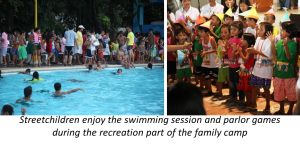DSWD Secretary Dinky Soliman (center), Undersecretary Parisya Taradji and DSWD-NCR Director Ma. Alicia S. Bonoan (left) listen as Mr. Rolando Masayda shares his experiences and learnings during the 3-day Family Camp for homeless street families at Island Cove in Cavite.
It may just be a three-day camping, but for a homeless street family, it is so far the best three days in their lives.
“Nagpapasalamat po talaga ako sa ating pamahalaan, partikular sa DSWD sa pagbibigay sa amin (street families) ng pansin at mapabilang sa Pantawid Pamilyang Pilipino Program. Masayang-masaya po kami ng aking mga anak dahil sa tatlong araw namin dito sa family camp ay na-experience namin na makatulog sa maganda at air-conditioned na tulugan, gayundin ang makakain ng mga masasarap na pagkain tatlong beses sa isang araw,” (I am thankful to the government, especially to the DSWD for giving us attention and be part of the Pantawid Pamilyang Pilipino Program. I and my children are also very grateful that we participated in this 3-day family camp because we experienced how to sleep in a comfortable and air-conditioned room, and eat delicious food three times a day), Mr. Rolando Masayda, a father of three children and a beneficiary of the Modified Conditional Cash Transfer (MCCT) Program for homeless street families, said.
Mr. Masayda also narrated that “Malaki din ang pasasalamat ko sa activity na ito dahil ako’y nakapaglaan ng maraming oras na makapag-bonding sa aking mga anak. Tunay ko pong naipadama sa kanila ang aking pagiging ama. Sa totoo lang po hindi ko napaglalaanan ng oras ang aking mga anak gaya ng ginawa ko sa kanila dito sa family camp, dahil ang oras ko po ay nagugugol ko sa pangangalakal sa lansangan upang mayroon akong maipakain sa aking mga anak. Dahil sa activity na ito natutuhan kong pahalagahan ang aking mga anak. (This activity proved to be very helpful because I spent more bonding time with my children. I rarely spend time with them because I am looking for opportunities to earn so that I can buy food for them. With this activity, I really felt good inside that I was able to show how much I care for my children).
Mr. Masayda is one of the 300 street families from the National Capital Region who participated in the 2nd batch of the Family Camp for Homeless Street families at the Island Cove in Cavite. The first batch was held on November 6-8 while the third and last batch is on-going from November 27-29. Around 900 homeless street families participated in the family camp.
The family camp provides an opportunity for the street families to experience various activities geared towards character building and personality development.
 The services offered during the three-day camp include: family development session, skills training, spiritual enhancement, gender sensitivity, empowerment training, forum on children’s rights, story-telling sessions, supervised neighborhood play, film showing, seminar on harmful effects of illegal drugs, zoo tour and swimming.
The services offered during the three-day camp include: family development session, skills training, spiritual enhancement, gender sensitivity, empowerment training, forum on children’s rights, story-telling sessions, supervised neighborhood play, film showing, seminar on harmful effects of illegal drugs, zoo tour and swimming.
The MCCT for Street Families covers poor families who were not included in the regular Pantawid Pamilyang Pilipino Program because of their mobile lifestyle and indefinite residence.
The MCCT provides a complete package of assistance to the street families which are not limited to education and health grants, but also include safe and responsive housing assistance with access to social services and economic opportunities for the improvement of their living conditions.
The street families under the MCCT project will also receive monthly cash grants for health and education, provided that they comply with the modified conditionalities.
The conditions that they should comply with are: parents should ensure that their children do not stay or work on the streets; parents/guardians should participate/attend the Family Life Education and Counseling, and Family Development Sessions conducted in their locale; children should be attending any mode of learning, either regular school, Alternative Learning System (ALS), School on Wheels or Supervised Neighborhood Play; parents/guardians should bring their children to health centers for immunizations, weight and height monitoring and preventive check-ups; and household beneficiaries must stay in alternative residences after identification, relocation and/or provision of shelter assistance for them.


